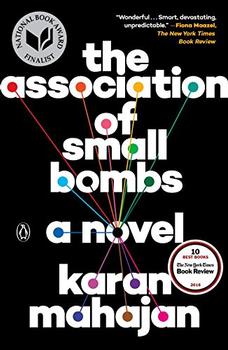Summary | Excerpt | Reviews | Beyond the Book | Readalikes | Genres & Themes | Author Bio

Critics' Opinion:
Readers' Opinion:
First Published:
Mar 2016, 288 pages
Paperback:
Oct 2016, 288 pages
 Book Reviewed by:
Book Reviewed by:
Kim Kovacs
Buy This Book
Excerpt
The Association of Small Bombs
The bombing, for which Mr. and Mrs. Khurana were not present, was a flat, percussive event that began under the bonnet of a parked white Maruti 800, though of course that detail, that detail about the car, could only be confirmed later. A good bombing begins everywhere at once.
A crowded market also begins everywhere at once, and Lajpat Nagar exemplified this type of tumult. A formless swamp of shacks, it bubbled here and there with faces and rolling carts and sloping beggars. It probably held four seasons at once in its gigantic span, all of them hot. When you got from one end of the market to the other, the wooden carts with their shiny aluminum wheels had so rearranged themselves that the market you were in was technically no longer the market you had entered: a Heisenbergian nightmare of motion and ambiguity. So the truth of the matter is that no one really saw the parked car till it came apart in a dizzying flock of shards.
Strange sights were reported. A blue fiberglass rooftop came uncorked from a shop and clattered down on a bus a few meters away; the bus braked, the rooftop slid forward, leaked a gorgeous stream of sand, and fell to the ground; the bus proceeded to crack it under its tires and keep going, its passengers dazed, even amused. (In a great city, what happens in one part never perplexes the other parts.) Back in the market, people collapsed, then got up, their hands pressed to their wounds, as if they had smashed eggs against their bodies in hypnotic agreement and were unsure about what to do with the runny, bloody yolk. Most startling of all, for the survivors and rescue workers both, was the realization that the main dusty square was rooted so firmly by half a dozen massive trees, trees that had gone all but unnoticed in all those years, their shadows dingy with commerce, their branches cranked low with hanging wares, their droppings of mulberry collected and sold— until the bomb had loosened the green gums of the trees and sent down a shower of leaves, which Mr. Khurana kicked up on the ground as he tried to uncover the bodies of his two sons.
But the leaves, turned crisp, shards themselves, offered nothing. His sons were dead at a nearby hospital and he had come too late.
The two boys were the sum total of the Khuranas' children, eleven and thirteen, eager to be sent out on errands; and on this particular day they had gone with a friend in an auto-rickshaw to pick up the Khuranas' old Onida color TV, consigned to the electrician for perhaps the tenth time. But when Mr. Khurana was asked by friends what the children were doing there (the boy with them having escaped with a fracture), he said, "They'd gone to pick up my watch from the watch man." His wife didn't stop him, and in fact colluded in the lie. "All the watches were stopped," she said. "The way they know the time the bomb went off is by taking the average of all the stopped watches in the watch man's hut."
Why lie, why now? Well, because to admit to their high-flying friends that their children had not only died among the poor, but had been sent out on an errand that smacked of poverty— repairing an old TV that should have, by now, been replaced by one of those self-financing foreign brands— would have, in those tragic weeks that followed the bombing, undone the tightly laced nerves that held them together. But of course they were poor, at least compared to their friends, and no amount of suave English, the sort that issued uncontrollably from their mouths, could change that; no amount of sobbing in Victorian sentences or chest beating before the Oxonian anchors on The News Tonight, who interviewed them, who stoked their outrage, could drape them or their dead children in the glow of foregone success: Mr. and Mrs. Khurana were forty and forty, and they had suffered the defining tragedy of their lives, and so all other competing tragedies were relegated to mere facts of existence. For a month afterwards, they made do without the TV, which for all they knew was still sitting in the basement workshop of the electrician, its hidden berths of microchips heavy with dust, its screen screwed off and put facedown on the floor, looking into nothing. They only caught their own mugs on The News Tonight because a neighbor knocked on their door and welcomed them into his house to watch the news. He was friendly with them ever after.
From The Association of Small Bombs by Karan Mahajan, published on March 22, 2016 by Viking, an imprint of Penguin Publishing Group, a division of Penguin Random House LLC. Copyright by Karan Mahajan, 2016.





The Flower Sisters
by Michelle Collins Anderson
From the new Fannie Flagg of the Ozarks, a richly-woven story of family, forgiveness, and reinvention.

The House on Biscayne Bay
by Chanel Cleeton
As death stalks a gothic mansion in Miami, the lives of two women intertwine as the past and present collide.

The Funeral Cryer by Wenyan Lu
Debut novelist Wenyan Lu brings us this witty yet profound story about one woman's midlife reawakening in contemporary rural China.
Your guide toexceptional books
BookBrowse seeks out and recommends the best in contemporary fiction and nonfiction—books that not only engage and entertain but also deepen our understanding of ourselves and the world around us.